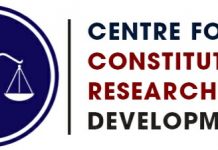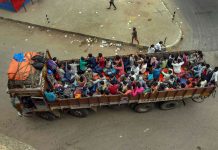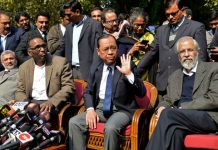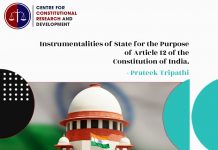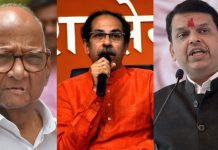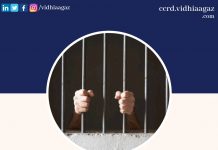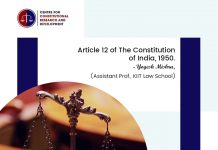RIGHT TO LIFE AND PERSONAL LIBERTY
The Constitution of India guarantees that no person shall be deprived of his life or personal liberty except according to procedure established by law. This has been enshrined in Article 21 of the Constitution, ensuring that the life and personal liberty of each and every individual in India, irrespective of whether or not he is a citizen, is protected.
The Courts in our country give utmost importance to this Article, placing it as the topmost fundamental right. This is due to the reason that this right is the core of the existence of each human being as the protection of the life of a person is the pre requisite to all the other rights that are guaranteed by the Constitution of India or any other law.
Article 21 in its interpretation also includes the right to live with ‘human dignity’ which includes all those components for the survival and efficient functioning of a person such as education, living wage, child care and so on as specified in the Directive Principles of State Policy.
Article 21, with the progression of time and society, has incorporated various other rights which need to be protected in order to enrich the life of an individual. The expanding horizon of Article 21 includes the right to livelihood, right to medical care, right to shelter, right against rape and sexual harassment, right to environment, right to die and many more. The right to privacy and the right to education are also encompassed in Article 21 of the Constitution of India.
ACCESS TO INTERNET AS A FUNDAMENTAL RIGHT
Faheema Shirin RK v. State of Kerala and Others[1], a case decided on 19th September, 2019 is of immense relevance in determining the nature of the right to access internet.
In this case, a suit was filed by a student of a college in Kerala, where internet between 6pm and 10pm was denied to all those living in the hostel. On refusal to abide by this rule, the student was made to vacate the hostel which gave rise to this suit.
Referring to Vishaka v. State of Rajasthan[2], the Court highlighted the importance of international conventions and norms, stating that they must be incorporated in the interpretation of the fundamental rights guaranteed in the Constitution of India and in consonance with the other laws on the specific subject. The Court further held that the right to access Internet forms a part of both, the Right to Education and the Right to Privacy. These rights fall under the expansive ambit of Article 21 of the Constitution of India.
The Court went on to explain that the only restriction that can be imposed is on activities that will cause a disturbance to others because while exercising one’s own right to privacy there must not be an invasion of another individual’s right to privacy.
Thus, according to the Kerala High Court, there clearly cannot be any arbitrary restriction on the internet services as it forms part of Article 21 of the Constitution of India which safeguards the right to life and personal liberty.
THE CURRENT SCENARIO
Amidst major protests against the Citizenship (Amendment) Act, 2019 all across the country starting with the states of the Northeast led by Assam, an indefinite internet shutdown began on 11th December, 2019 in various regions of Assam’s best-known city, Guwahati. Starting with the suspension of cellular internet, a subsequent suspension of broadband services followed. Though the broadband services were restored on 17th December, 2019, the cellular internet services continued to be suspended for days after. The internet was finally restored after nine days on 20th December, 2019, after a direction of the Guwahati High Court for lifting the ban.
The Court held that there was no instance as showed by the Government that the lives of the citizens were being disrupted in context of the law and order situation due to the internet services. Hence the internet services were resumed on this date.
ISSUE WITH INTERNET SHUTDOWNS
The aforesaid scenario in Guwahati ending with the order of the Court raises questions of great significance. Firstly, whether internet can be disabled in any region of the country via a mere notification containing insufficient grounds. The ban on cellular internet services via a notification by the Governor in the districts of Guwahati city specified the possibility of social media applications such as Facebook, WhatsApp, Twitter and YouTube being used to spread rumours as a ground for disabling internet services.
Secondly, whether a group of people putting across their opinion and dissatisfaction against a law made by a democratic government that is supposed to make laws for this very group should result in an internet shutdown. Most of the protests in Guwahati were witnessed to be silent protests such as musical protests, rejection of the Act and so on which did not incite violence of any sort.
Thirdly, across a region, if there are certain individuals indulging in protests, whether it is correct to suspend such services for other groups who are not active in such activities. Also, whether those areas that have indulged in no protests should undergo an internet ban as well. Though various regions across Assam have erupted in widespread protests, it can be said with conviction that there were many people who were not a part of the same. However, the suspension of internet services has affected all these people, and also regions where protests were not observed.
SUGGESTIONS
The Right to Life under Article 21 of the Constitution of India must be given supreme importance and respect. As the right to access internet is considered by a competent court to be a fundamental right under Article 21, internet services should not be banned unless there exists a genuine threat to security at the gravest degree, such as a war or a cause for a national emergency. Banning of these services should be avoided by the State Governments on the event of protests which are a mere way of expression for the people and not considered as instruments to cause harm.
A suggestion in this regard is that in future circumstances, only those individuals and areas which are proven to be indulging in violent protests that are definitely grave and widespread enough to endanger security and shatter the peace of the country should face a ban on the internet services. No other individual or area should be subject to such a ban due to the safeguard of the fundamental right to life and personal liberty.
CONCLUSION
Applying the pertinent decision of the Kerala High Court in the present context, a ban on the internet is not justified. Even though there exist two main provisions that allow the restriction of internet namely Section 144 of the Code of Criminal Procedure and Section 69A of the Information Technology Act, 2000, it is important to note whether or not the grounds are sufficient for the application of these provisions. Article 21 of the Constitution of India is the prime right granted to all the people in India and its curtailment has a serious impact on society due to which the grounds for restrictions must be grave and of immense magnitude.
The questions raised above clearly indicate that the grounds for curtailing internet services in Guwahati indeed had to be put to an end as the grounds were not sufficient for a ban for an extended time period. Areas which observed silent protests were also subject to a restriction of mobile internet. Further, various areas that were peaceful and did not witness any protests throughout those nine days were still made to face the ban internet services.
The purpose of the protest in the present situation is to speak up about an opinion and show dissatisfaction, which is a direct implication of a democracy. It does not result in as grave a situation to justify the disregard to the Right to Life of all individuals in the area of Guwahati, including those who were not involved in any of the protests as well as those which were not violent.
A nine-day ban can cause a severe impact to the right to life and personal liberty of an individual. Hence, internet bans should not be imposed so easily on the general public. Their Right to Life and Personal Liberty must be regarded and upheld prior to any such order with insufficient grounds or grounds of a lesser magnitude.
[1] Faheema Shirin.R.K vs State Of Kerala, 2019 W.P(C).No.19716/2019-L.
[2] Vishaka & Ors. v. State of Rajasthan & Ors, AIR 1997 SC 3011.


